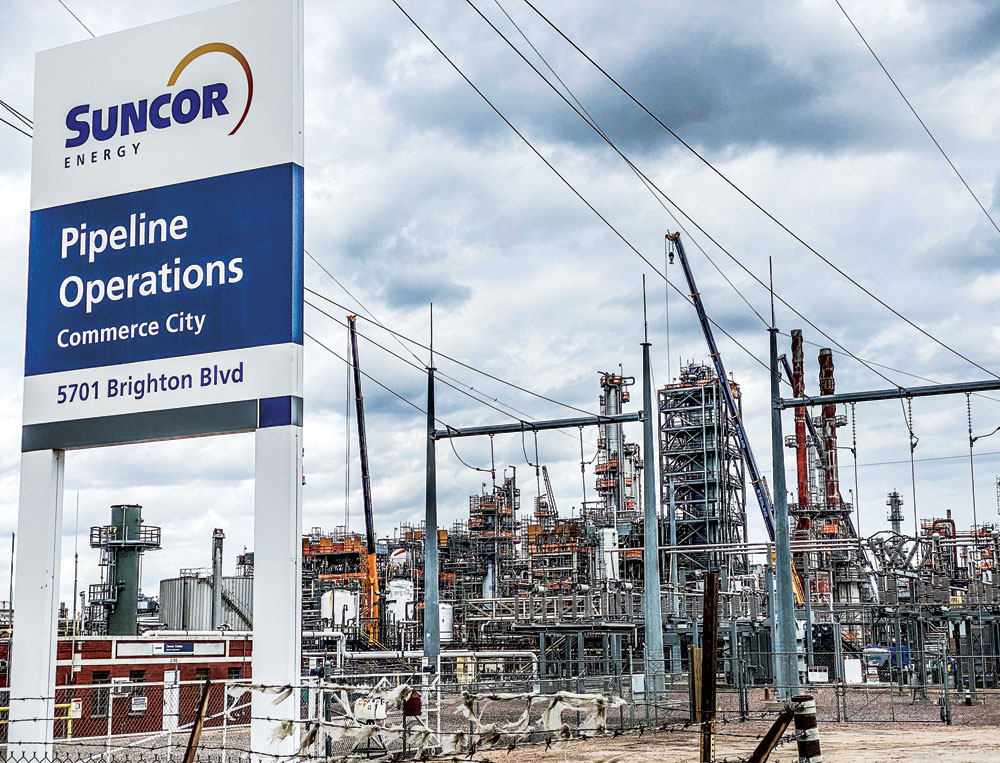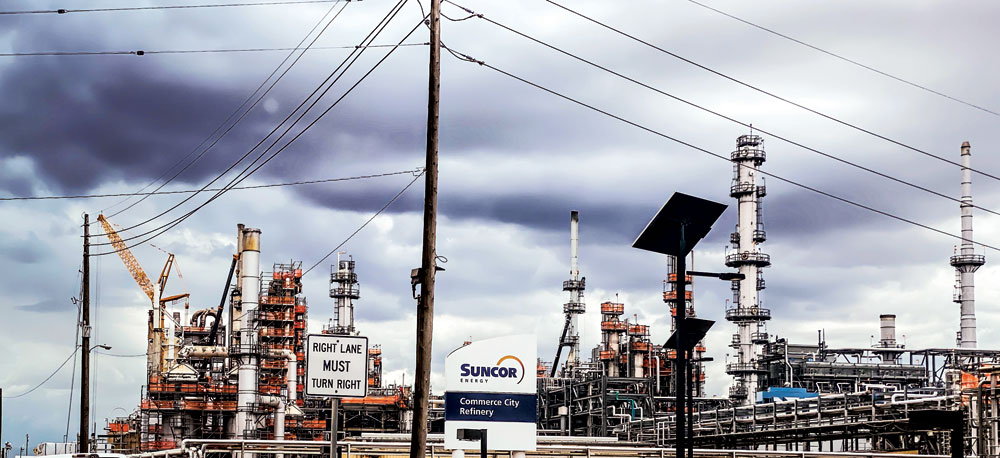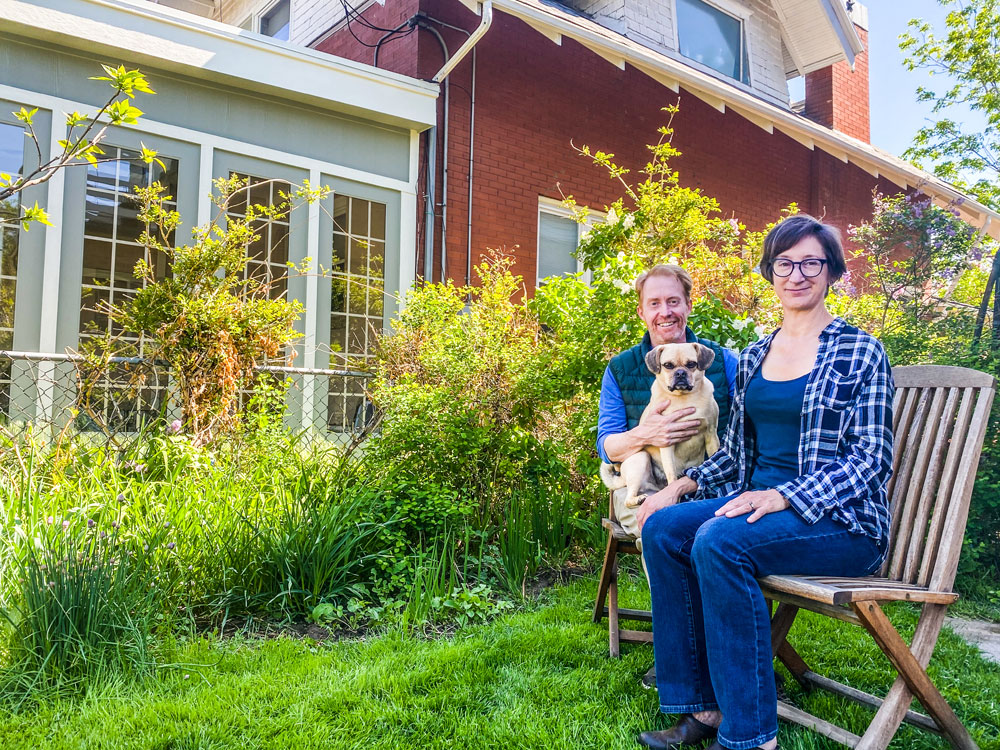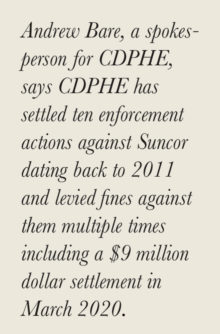
Suncor Energy is seeking a permit renewal for its Plant 2 amidst concerns from neighbors that pollution standards are being violated. Plants 1 and 2 are major suppliers of gasoline and diesel fuel for Colorado, including DIA’s main source of jet fuel. Plant 3 is the state’s main producer of asphalt.
In recent weeks, environmental advocacy groups and concerned neighbors have called on the Colorado Department of Public Health and Environment (CDPHE) and their subsidiary the Air Pollution Control Division (APCD) to deny one of Suncor Energy’s operating permits.
The embattled refinery, which, in recent public comments has been characterized as a reckless oil cowboy who willfully flouts regulations with an eye only on the bottom line, is nevertheless an economic and energy powerhouse in the state. According to their website, Suncor supplies locally-sourced fuel to businesses and residents in the Rocky Mountain Region and turns 98,000 barrels of crude oil a day—including that locally harvested from the Julesburg Basin—into various products, 95 percent of which are sold and used in Colorado. They supply fuel to more than 225 Shell, Exxon, and Mobil sites in Colorado and Wyoming, serving about 15 million people each year. They employ 500 Coloradans directly while supporting more than 5,000 jobs indirectly, with a total payroll impact of more than $250 million. Their operations and fuel sales have generated over $200 million in Colorado state, county, and municipal taxes over the past five years, averaging $40 million annually. Their estimated annual contribution to the state’s economy is $2.5 billion.

Suncor’s Plant 2 permit expired in 2011, but it has been allowed to continue operating since they have filed for renewals on time, as regulations require.
The Canadian-owned company, Colorado’s only oil and gas refinery, consists of three plants. The refinery currently operates on two permits, one for Plant 2, and one for Plants 1 and 3. Plants 1 and 2 are major suppliers of gasoline and diesel fuel for Colorado, including DIA’s main source of jet fuel. Plant 3 is the state’s main producer of asphalt. It’s the Plant 2 permit that is currently under advisement.
Community Concerns
 But despite being an economic fixture, Suncor is seen as a health threat by many who live nearby. The EPA ranks it as one of Colorado’s top industrial polluters, emitting more than 850,000 tons of air pollution each year. Lucy Molina, a Commerce City resident who suffers from fibromyalgia and migraines, says the refinery is responsible for chronic illnesses that have plagued her family and neighbors for years. “My grandmother died of leukemia two years ago. My daughter lives in darkness because of her migraines. My son can’t play basketball with his friends without getting a bloody nose. My neighbor, Mark, has brain cancer. There are people with stomach cancer, people with hospitals in their homes, people wearing diapers. Even my dog died—he was full of tumors. This is the norm here,” she says. People need environmental education; they need to know.”
But despite being an economic fixture, Suncor is seen as a health threat by many who live nearby. The EPA ranks it as one of Colorado’s top industrial polluters, emitting more than 850,000 tons of air pollution each year. Lucy Molina, a Commerce City resident who suffers from fibromyalgia and migraines, says the refinery is responsible for chronic illnesses that have plagued her family and neighbors for years. “My grandmother died of leukemia two years ago. My daughter lives in darkness because of her migraines. My son can’t play basketball with his friends without getting a bloody nose. My neighbor, Mark, has brain cancer. There are people with stomach cancer, people with hospitals in their homes, people wearing diapers. Even my dog died—he was full of tumors. This is the norm here,” she says. People need environmental education; they need to know.”
As part of the renewal process, the Air Quality Commission, a nine-member panel that oversees the air pollution division of CDPHE, hosted two public comments hearings in early May. The majority of comments focused on two issues—Suncor’s ability to operate on outdated permits and Suncor’s pollution which consistently exceeds the limits outlined in its permits.

Park and Susan Gamble are pictured at their Park Hill home with their dog Scout. Susan says, “I’m not a scientist. I’m not a lawyer. I’m just a mom, but I’m paying attention, and I know point-source pollution is the best place to start. We have this refinery right here, and this is where our community can play a part in solving this problem.”
Suncor’s Operating Permit
Plant 2’s permit technically expired in 2011. Jeremy Nichols, the Climate and Energy Program Director at WildEarth Guardians, one of the advocacy groups that would like to see Suncor shut down, equates it to driving on an outdated license. “It basically allows Suncor to be behind the wheel of this large source of air pollution.” In an email, Andrew Bare, a spokesperson for the CDPHE, refuted the analogy writing, “It is not the equivalent of driving on an expired license. Federal law allows these facilities to operate under the current permits if they file a renewal application on a timely basis.” Susan Gamble, a Park Hill resident, who’s followed the permit renewal process, says she’s fed up with the technicalities. “Are they the department of filing paperwork on time, or are they the department of air quality?”
Violations and Enforcement
According to Bare, the CDPHE has settled ten enforcement actions against Suncor dating back to 2011 and has levied fines against them multiple times including a $9 million dollar settlement in March 2020, which required Suncor to hire a third party to investigate “root causes of pollution.” Suncor hired Kearney, a consulting firm, that determined Suncor was both adequately built and staffed; therefore concluding human factors across four categories—culture, staff capabilities, processes, and technological/physical safeguards—were responsible for the refinery’s failures.
 When asked if they were considering a change in leadership either through personnel or policy, Suncor responded, “Out of respect to the process and in compliance with rules set by CDPHE, we’ll provide a written response ten days after the public comment period has ended. As Colorado’s only refinery and as a part of the community, we’re working to meet the energy needs of Coloradans, to do our part to support the local economy, and to reduce the environmental impacts of our operations. We take our responsibilities to the community seriously and are committed to the actions outlined in the improvement plan as part of our journey to improve our operations and build trust.”
When asked if they were considering a change in leadership either through personnel or policy, Suncor responded, “Out of respect to the process and in compliance with rules set by CDPHE, we’ll provide a written response ten days after the public comment period has ended. As Colorado’s only refinery and as a part of the community, we’re working to meet the energy needs of Coloradans, to do our part to support the local economy, and to reduce the environmental impacts of our operations. We take our responsibilities to the community seriously and are committed to the actions outlined in the improvement plan as part of our journey to improve our operations and build trust.”
Of the $9 million settlement, Suncor is required to spend $5 million implementing Kearney’s recommendations. The remaining $4 million will go to the state and to neighbors to spend on environmental projects, including $2.6 million to benefit the surrounding communities.
The Improvement Plan
Suncor’s improvement plan, which has already upgraded automatic shutdown systems in Plant 2, will do the same to Plant 1 by the end of June this year. They also plan to install a Programmable Logic Controller (PLC) as well as upgraded instrumentation, automated shutdown valves, and new hydraulic pressure units by 2023 to make shutdown more reliable. The improvement plan also calls for changes to safety and reliability practices as well as training, and culture. The total cost of implementation is estimated at $12 million.
What will the future bring?
The extent to which Suncor will be part of Colorado’s energy future remains to be seen. According to Bare, “even if CDPHE does revoke their permit, Suncor could choose to immediately shut down the refinery, but they could also pursue legal challenges, including asking for a stay from the Air Quality Control Commission or district court to allow them to operate Plant 2 while the denial is undergoing review.”
The timing for a final decision on the permit renewal is not known. “We cannot predict a date certain for a final decision,” wrote Bare in an email. “We will review and respond to all of those [public] comments. After that, we’ll submit the permit to the federal Environmental Protection Agency for a 45-day review period and respond to any comments the agency might offer. We’re going to carefully review the permit application and the comments to ensure we’re protecting public health and the environment.
Front Porch photos by Christie Gosch



0 Comments